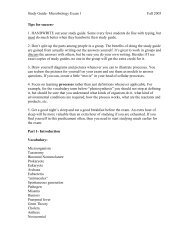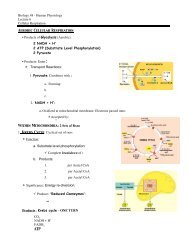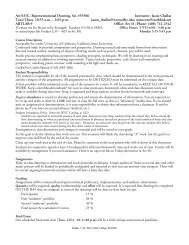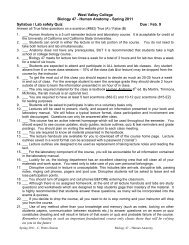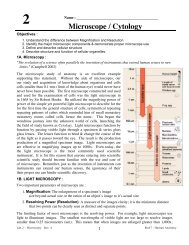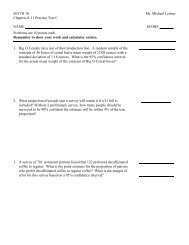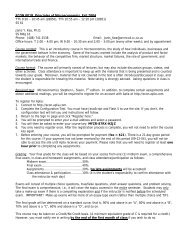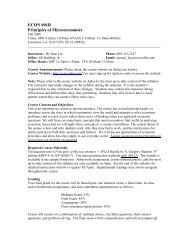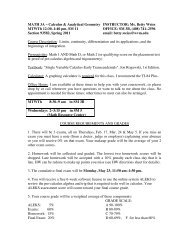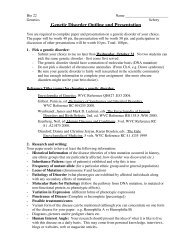ECON 001B Principles of Microeconomics - West Valley College
ECON 001B Principles of Microeconomics - West Valley College
ECON 001B Principles of Microeconomics - West Valley College
Create successful ePaper yourself
Turn your PDF publications into a flip-book with our unique Google optimized e-Paper software.
<strong>ECON</strong> <strong>001B</strong><br />
<strong>Principles</strong> <strong>of</strong> <strong>Microeconomics</strong><br />
Fall 2006<br />
Times: MW 9:20am–10:45am (47320), F 8:00am–11:10am (48826)<br />
Locations: LA 10 (47320), SS 61 (48826)<br />
______________________________________________________________________________<br />
Instructor: Dr. Sam Liu Phone: 408-741-2147<br />
Office: SS Building 1b Email: samuel_liu@westvalley.edu<br />
Office Hours: MW 12:20pm-1:20pm, TTh 10:45am-11:45am<br />
Course Announcements: Please check the course website on Aplia (see below).<br />
Course Website: http://econ.aplia.com You must sign up for Aplia in order to access the website.<br />
Note: Please refer to the course website on Aplia for the most up-to-date version <strong>of</strong> the syllabus.<br />
The instructor may make changes to the syllabus during the semester. It is the student’s<br />
responsibility to stay informed <strong>of</strong> these changes. Students may contact the instructor during<br />
<strong>of</strong>fice hours and before/after class, time permitting. Students may also wish to have a study<br />
partner whom they can contact if they miss class.<br />
Course Content and Objectives<br />
This is an introductory course in microeconomics. The course has several principal goals: to<br />
introduce you to the ways in which economists view the world and attempt to solve economic<br />
problems, and to teach you to utilize these ways <strong>of</strong> thinking when you approach economic<br />
questions. We will focus on some basic concepts that most economists find useful in analyzing<br />
economic issues and we will apply these concepts to a variety <strong>of</strong> problems. The central theme <strong>of</strong><br />
the course is how and why markets work, why they may fail to work, and the implications for<br />
public policies <strong>of</strong> both their successes and failures. We will discuss applications <strong>of</strong> economic<br />
principles and show how they apply to our everyday world. Asking questions and participating in<br />
discussions are strongly encouraged.<br />
Required Course Materials<br />
The required text is <strong>Principles</strong> <strong>of</strong> <strong>Microeconomics</strong> + APLIA Bundle by N. Gregory Mankiw, 4 th<br />
edition (ISBN #: 0-324-36020-7). You must purchase this textbook with APLIA. This bundle is<br />
available at the campus bookstore. Homework assignments, course announcements, and the most<br />
up-to-date version <strong>of</strong> the syllabus are only available on Aplia. See the end <strong>of</strong> this syllabus for<br />
detailed instructions on how to register for Aplia. Supplemental readings may also be assigned<br />
throughout the course.<br />
Grading<br />
Your final grade for the course will be based upon: one midterm exam, a final exam, in-class<br />
and/or homework assignments, and class attendance/participations as follows:<br />
Midterm Exam: 25%<br />
Final Exam: 45%<br />
Assignments: 20%<br />
Class attendance/participation: 10%<br />
Exams will consist <strong>of</strong> a combination <strong>of</strong>: multiple choice, true/false questions, short answer<br />
questions, and problem solving. The final exam will be comprehensive and will encompass all
topics covered in the entire semester. The final grade will be determined on a standard curve; that<br />
is, 90% and above is an “A”, 80% and above is a “B”, 70% and above is a “C”, 60% and above is<br />
a “D”, and so on.<br />
It is the student’s responsibility to confirm attendance with the instructor each day and to<br />
complete and submit assignments on time. No late assignments will be accepted. I understand<br />
that emergencies occur on occasion so I will allow you to skip three assignments throughout the<br />
course without penalty. If you choose not to skip an assignment, I will drop your three lowest<br />
grades on assignments. However, to do well in this course, it is important that you do all <strong>of</strong> the<br />
assignments even if you end up skipping one due to an emergency.<br />
This course may be taken on a Credit/No Credit basis. (A minimum equivalent grade <strong>of</strong> C is<br />
required for a credit.) However, you must notify me in writing within the first 4 weeks <strong>of</strong> the<br />
semester if you wish to do so.<br />
Exam Policy<br />
All exams must be taken on the day it is scheduled for that particular class otherwise you will<br />
receive a 0 on that exam. Each student must bring Photo Identification (e.g., student ID) to each<br />
exam. Use <strong>of</strong> electronic devices (e.g., calculators, dictionaries, etc.), notes, or books is NOT<br />
permitted during exams. In the event <strong>of</strong> a suspected bone fide grading error, students must notify<br />
the pr<strong>of</strong>essor within one week <strong>of</strong> when the exam was returned. The entire exam will be re-graded<br />
and this may result in lower total points.<br />
Please refer to page 180 <strong>of</strong> the WVC catalog for the final exam schedule.<br />
Makeup Exam Policy<br />
The dates for the midterm exams are fixed and I will not allow any makeup exams. If you are<br />
unable to attend the midterm due to a medical emergency then you must provide written evidence<br />
explaining this situation AND you must inform me <strong>of</strong> the situation before the scheduled exam. If<br />
both <strong>of</strong> these conditions are met then I will increase your final exam weight to include that <strong>of</strong> the<br />
midterm (increase from 45% to 70%). In all other circumstances if you miss the midterm you<br />
will receive a 0 on the midterm.<br />
A final exam may be made up only in extreme circumstances and only at the discretion <strong>of</strong> the<br />
instructor. If you are unable to attend the final due to an extreme emergency then you must<br />
provide written evidence from an authority explaining this situation AND you must inform me <strong>of</strong><br />
the situation before the scheduled exam. If both <strong>of</strong> these conditions are met then I will give a<br />
makeup exam that will be more <strong>of</strong> an essay-type exam (as opposed to multiple choice and<br />
true/false). In all other circumstances if you miss the final exam you will receive a 0 on the final<br />
exam.<br />
Drop Policy<br />
It is the student’s responsibility to drop the class. All students who are listed on the <strong>of</strong>ficial roster<br />
at the end <strong>of</strong> the course must be issued a grade. If, for some reason, you need to drop the class,<br />
you must do so <strong>of</strong>ficially through the <strong>of</strong>fice <strong>of</strong> Admissions & Records.<br />
Class Conduct<br />
Please be considerate <strong>of</strong> your fellow students. Each student is expected to help maintain a<br />
positive classroom environment conducive to learning. Please turn <strong>of</strong>f your cell phone ringer and<br />
do not use it during class. I consider late arrivals, early departures, sleeping and/or talking to be
ude and disruptive to the class in addition to making it harder for the students around you to<br />
learn the material they need to pass the exams.<br />
Student Attendance Policy<br />
Students are expected to attend all sessions <strong>of</strong> each class. Instructors may drop students from the<br />
class if they fail to attend the first class meeting, or when accumulated unexcused hours <strong>of</strong> absences<br />
exceed ten percent <strong>of</strong> the total number <strong>of</strong> hours the class meets during the semester. Moreover, an<br />
instructor may drop from the class any student who fails to attend at least one class session during<br />
the first three weeks <strong>of</strong> instruction. (from WVC Catalog, p. 182) In addition, attendance and class<br />
room participation contribute to your overall grade in the course. (see above)<br />
Policy on Academic Dishonesty<br />
There is a no-tolerance policy on violations <strong>of</strong> academic honesty standards in this course and<br />
violators will be punished to the fullest extent warranted. Please refer to WVC Catalog, p. 182.<br />
Disability Accommodations<br />
<strong>West</strong> <strong>Valley</strong> <strong>College</strong> makes reasonable accommodations for persons with documented disabilities.<br />
Students should notify DESP (Disability and Educational Support Program) located in the Learning<br />
Services building (408-741-2010) <strong>of</strong> any special needs.<br />
Unlawful Discrimination/Sexual Harassment<br />
If you have a complaint or someone has shared information with you as a student or employee that<br />
is unlawful discrimination or sexual harassment, contact the Associate Vice Chancellor <strong>of</strong> Human<br />
Resources at <strong>West</strong> <strong>Valley</strong>-Mission Community <strong>College</strong> District, Human Resources Department,<br />
(408-741-2060). If the Associate Vice Chancellor <strong>of</strong> Human Resources is not available, contact the<br />
President <strong>of</strong> the college in which you attend or are employed. For <strong>West</strong> <strong>Valley</strong> <strong>College</strong>, contact the<br />
<strong>of</strong>fice <strong>of</strong> Dr. Philip Hartley at 408-741-2097.<br />
Some Suggestions<br />
To be successful in this course, the following suggestions are <strong>of</strong>fered:<br />
1. Regularly check the course webpage for updates and announcements.<br />
2. Attend all classes. Not only is attendance a part <strong>of</strong> your final grade but I will cover material<br />
not included in the reading assignments. Lecture notes will not be posted.<br />
3. Review the readings before class. Work problems and practice quizzes that pertain to the<br />
assignment in advance <strong>of</strong> class discussions. Problems and practice quizzes may be found at<br />
the end <strong>of</strong> each chapter.<br />
4. Reread the assignment for clarity after classes. Some times rereading certain sections several<br />
times will be necessary to obtain a firm grasp <strong>of</strong> a concept.<br />
5. You are strongly encouraged to work through the homework assignments on your own<br />
because you can’t learn economics without learning how to solve the problems. Questions<br />
on the exams are very similar to, but not exactly like, the questions on these problem sets.<br />
Thus, the assignments provide good practice and review for the exams.<br />
6. The Aplia problem sets come in pairs <strong>of</strong> practice and graded problem sets. The practice<br />
sets give you immediate feedback about whether your answer is right or wrong and an<br />
explanation <strong>of</strong> the correct answer. They are not counted as part <strong>of</strong> your homework grade.<br />
Use them to check your understanding <strong>of</strong> the material. The graded problem sets have a<br />
firm due date. You can change your answers as many times as you like before the due date<br />
has passed. Once the due date has passed, the grade will be recorded and it will not be<br />
possible to change your answers or complete the assignment. After the due date, you will<br />
be able to see the correct answers and the explanations for graded problems.
Tentative List <strong>of</strong> Topics and Readings<br />
Note: This list will be updated periodically. Please check the course webpage on Aplia for the<br />
most up-to-date list <strong>of</strong> topics and readings.<br />
Week Topics Readings<br />
1<br />
Overview and introduction, 10 basic principles <strong>of</strong><br />
economics, review <strong>of</strong> graphing<br />
2 The market forces <strong>of</strong> supply and demand Ch. 4<br />
3-4<br />
5<br />
Elasticity and its applications; Supply, demand, and<br />
government policies<br />
Consumers, producers, and the efficiency <strong>of</strong> markets<br />
Ch. 1, 2, Ch. 2 appendix<br />
Ch. 5, 6<br />
Ch. 7<br />
6 Taxation; The tax system Ch. 8, 12<br />
7 Externalities; Public goods and common resources Ch. 10, 11<br />
8<br />
9<br />
MIDTERM EXAMS:<br />
(Wed.) for MW class<br />
(Thur.) for TTh classes<br />
BREAK<br />
10 Costs <strong>of</strong> production; Theory <strong>of</strong> the firm Ch. 13, 14, 15<br />
11 Monopoly Ch. 15<br />
12 Oligopoly; Monopolistic competition Ch. 16-17<br />
13-14<br />
15<br />
16<br />
Market for factors <strong>of</strong> production; Earnings and<br />
discrimination, income inequality and poverty<br />
Theory <strong>of</strong> consumer choice; Comparative advantage;<br />
International trade; Frontiers <strong>of</strong> microeconomics<br />
FINAL EXAMS<br />
To Register for Aplia<br />
Ch. 18, 19-20<br />
Ch. 21, 3, 9, 22
**DO NOT PURCHASE A TEXTBOOK AT THE BOOKSTORE UNTIL YOU READ THIS**<br />
You will be using Aplia for this course. Aplia is an online product that contains both a digital<br />
version <strong>of</strong> the textbook and online homework.<br />
Your course key is: 2Q2G-2LAT-CRBG<br />
How to Use Aplia<br />
Step 1: Register for Your Aplia Course<br />
First Time Aplia Users:<br />
1. Connect to http://econ.aplia.com<br />
2. On the Sign In page, click the Go button next to "Test Your System Configuration"; this<br />
takes just a few seconds and provides detailed information on how to update your system<br />
if necessary<br />
3. Head back to the Sign In page and click the "Register Here" link<br />
4. Fill out the form and click Continue<br />
5. Enter Your Course Key (above)<br />
Returning Aplia Users:<br />
1. Connect to http://econ.aplia.com and sign in using your usual e-mail and password<br />
2. Enter your course key (above)<br />
Problems with registration or sign in? You can always e-mail Aplia by clicking on the "Help" link<br />
in the upper-right corner <strong>of</strong> any page or by e-mailing support@aplia.com.<br />
Step 2: Choose Your Payment Option (You have until 09.18.06 to pay for your course and decide<br />
which option to choose)<br />
You have several payment options. To find the right option for you, decide whether you want to<br />
purchase a physical textbook.<br />
Note that your Aplia course includes a digital edition (online version) <strong>of</strong> the textbook. The<br />
physical text is optional.<br />
Do you want to buy a physical textbook?<br />
If No, simply pay for your Aplia course ($60.00):<br />
Instructions on the Aplia website walk you through the payment process. There are<br />
several ways to pay. You can pay online with credit, debit, or electronic check. Aplia also<br />
accepts money orders mailed to: Aplia, Inc., 959 Skyway Rd, Suite 325, San Carlos, CA<br />
94070.
If Yes, choose from these two options:<br />
1. Purchase a physical textbook through Aplia ($60.00 for Aplia, plus $50.00 for the physical<br />
textbook and $5.00 in shipping and handling)<br />
Or<br />
First, purchase your Aplia course. Instructions on the Aplia website walk you through the<br />
payment process. You can pay online with credit, debit, or electronic check. Aplia also<br />
accepts money orders mailed to: Aplia, Inc., 959 Skyway Rd, Suite 325, San Carlos, CA<br />
94070.<br />
Next, purchase your physical textbook from Aplia. After you pay for your Aplia course<br />
you can order a textbook through Aplia. Just sign into your Aplia course, click on the<br />
Bookstore link on your Home page, and follow the prompts to place your order.<br />
You can view Aplia's refund policy on textbooks in Aplia's Terms and Conditions <strong>of</strong> Use:<br />
http://econ.aplia.com/af/support/terms.jsp?<br />
2. Buy your physical textbook from the campus bookstore (price determined by bookstore)<br />
Textbooks from your campus bookstore come bundled with an Aplia Payment Code. Use<br />
the payment code to pay for your Aplia course online. The Aplia Payment Code covers<br />
your entire Aplia course fee. Aplia does not refund courses paid for with an Aplia<br />
Payment Code.<br />
Grace period for payment: You may register and use the website until 09.18.06 without paying<br />
the fee. If you are considering dropping this course during the drop/add period, do not make a<br />
payment until you decide to stay in the course. You need to pay the full amount before the end <strong>of</strong><br />
the grace period to continue using the site.<br />
Aplia assignments: Most assignments come in pairs <strong>of</strong> practice problem sets and graded problem<br />
sets. Practice problem sets give you immediate feedback and an explanation <strong>of</strong> the correct<br />
answer. They do not count toward your homework grade. Use them to check your understanding<br />
<strong>of</strong> the material. If you feel confident about the material, you can go directly to the graded set and<br />
refer to the practice set only if you want some help.<br />
The graded problem sets have a firm due date. You can change your answers as many times as<br />
you like before the due date passes. Once the due date passes, Aplia records your grade and you<br />
can no longer change your answers or complete the assignment. After the due date, Aplia displays<br />
the correct answers and explanations for graded problems.<br />
FAQ<br />
What is an Aplia Payment Code and how can I get one?<br />
The Aplia Payment Code is just another way to pay your Aplia course fee. You can find it<br />
bundled with your text. Your Aplia Payment Code is different from your Aplia Course Key. The<br />
course key allows us to identify your economics class and pr<strong>of</strong>essor; the payment code tells us
that you prepaid your entire Aplia course fee when you purchased the code. An Aplia Payment<br />
Code follows the format <strong>of</strong> xxxxx-xxx-xxxxx-xxx and is printed on a separate card included with<br />
your textbook.<br />
What if I purchase a payment code after paying for Aplia with my credit/debit card or electronic<br />
check?<br />
We can refund your payment. To speed up the refund process, sign into your Aplia course and go<br />
to the My Account tab. Click on My Courses, and enter your payment code. You will then receive<br />
an automatic refund.<br />
Under what circumstances can I get a refund?<br />
You are entitled to a refund if you submit a refund request to Aplia during the original grace<br />
period for payment. The grace period for your course expires on 09.18.06. No refunds will be<br />
granted after this date. Requests for refunds must be submitted by email or letter and received by<br />
Aplia within the stipulated time period. Contact support@aplia.com or write to Aplia, Inc., 959<br />
Skyway Rd, Suite 325, San Carlos, CA 94070 USA, to request a refund.<br />
Note: No refunds are issued for courses paid for with an Aplia Payment Code under any<br />
circumstances.<br />
How do I access my textbook on the Aplia website?<br />
A digital version <strong>of</strong> your textbook is available in your Aplia course. You can access textbook<br />
chapters on the Home page or through your weekly assignments.<br />
Disclaimer: I receive no monetary benefit from requiring Aplia assignments.



